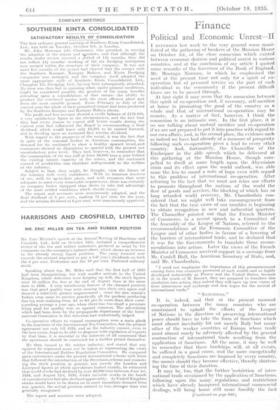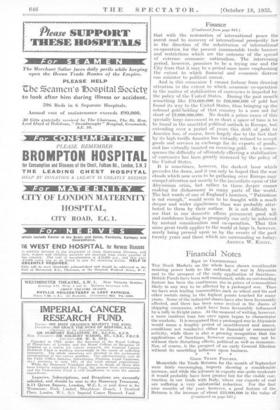Finance
Political and Economic Unrest—If
I REFERRED last week to the very general sense mani- fested at the gathering of bankers at the Mansion House on October 1st, of the close connexion which existed between economic distress and political-unrest in various countries, and at the conclusion of my article I quoted some remarks of the Governor of the Bank of England, Mr. Montagu Norman, in which he emphasised the need at the present time • not only for a spirit of co- operation but of personal service on the part of each individual in the community if the present difficult times are to be passed through. ' At first sight it may seem that the connexion between this spirit of co-operation and, if necessary, self-sacrifice at home in "Promoting the good of the country as a whole and that of international co-operation may be remote. As a matter of fact, however, I think the connexion is an intimate one. In the first place, it is no use talking about mutual sacrifice and co-operation if we are not prepared to put it into practice with regard to our own affairs, and, in the second place, the evidence such • as indeed we have had already of a measure of prosperity following such co-operation givei a lead to every other country. And, fortunately, the Chancellor of the Exchequer in the able speech which he delivered at this gathering at the Mansion House, though com- pelled to dwell at some length upon the Abyssinian crisis and its effect upon the world outlook, was able none the less to sound a note of hope even with regard to this problem of international co-operation. After referring to the fact that we must not relax our efforts to promote throughout the nations of the world the flow of goods and services, the blocking of which has so long retarded world recovery, Mr. Chamberlain con- sidered that we might well take encouragement from the fact that the true cause of our troubles is beginning to obtain recognition in new and influential quarters. The Chancellor pointed out -that the French Minister • of Commerce, in a recent speech to a Committee of the Assembly of the League of Nations, referred to the recommendations of the Economic Committee of the League and of other bodies in favour of a lowering of the barriers of international trade, and he declared that it was for the Governments to translate those recom- mendations into action. Later the views of the French Minister of Commerce received support in a message from Mr. Cordell Hull, the American Secretary of State, and, said Mr. Chamberlain, I need not emphasise the importance of this pronouncement coming from two countries possessed of such wealth and so highly developed industrially as France and the United States, because if, in the words of M. Bonnet, they are prepared to translate this resolution into action, then indeed they will open up new vistas of freer intercourse and exchange and new hopes for the revival of international trade."
" SANCTIONS."
It is, indeed, sad that at the present moment co-operation between the many countries who are constrained to uphold the . efforts of the League of Nations in the direction of preserving international peace should have to take the form of .Sanetions which must almost inevitably hit not merely Italy .- but many other of the weaker countries of Europe whose trade must almost surely be adversely affected by the general contraction of international trade resulting from the application of Sanctions. All the same, it may be well to remember that these hardships will, at all events, be suffered in a good cause, and the more energetically and completely Sanctions are imposed by every country, the sooner should they become effective, thereby- shorten- ing the time 2it their duration. It may be, too, that the further 'restriction of inter- national trade occasioned by the application of Sanctions, following upon the many regulations and restrictions which have already hampered international commercial dealings, will bring. home still more forcibly the fact' (Continued on page 646.)
Finance
(Continued from page 844.)
that with the restoration of international peace the surest road to recovery of international prosperity lies in the direction of the substitution of international co-operation for the present innumerable trade barriers and restrictions which are the outcome of the spread of extreme economic nationalism. The intervening period, however, promises to be a trying one and the City fears that it may be a period once more emphasising the extent to which financial and economic distress can minister to political unrest. And in this connexion I cannot forbear from drawing attention to the extent to which economic co-operation. in the matter of stabilisation of currencies is impeded by the policy of the United States. During the past month something like £70,000,000 to £80,000,000. of gold has found its way to the United States, thus bringing up the colossal gold-holding of that country to a sum not far short of 12,000,000,000. No doubt a prime cause of this specially large movement in so short a space of time is to be found in the unsettled political outlook in Europe, but extending over a period of years. this drift of .gold to America has, of course, been largely due to the fact that by its high tariffs America has virtually refused to accept goods and services in exchange for its exports of goods, and has virtually insisted on receiving gold. As a conse- quence the difficulty of ultimately effecting a stabilisation of currencies 'has been greatly increased by the policy of the United States.
It is sometimes, however, the darkest hour which precedes the dawn, and it can. only be hoped that the war clouds which now seem to be gathering over Europe. may compel attention not merely to the immediate cause of the Abyssinian crisis, but rather . to those . deeper causes making for disharmony in many parts of, the- world. The last words of one of England's heroines, " Patriotism is not enough," would seem to be fraught with a much deeper and wider significance than was probably attri- buted to them by their author. It is not difficult to see that in our domestic affairs permanent good will and confidence leading to prosperity can only be achieved, by mutual consideration and co-operation. That this same great truth applies to the world at large is, however, surely being pressed upon us by the events of the past twenty years and thOse which arc surrounding us today: ARTHUR W. KIDDY.



























































 Previous page
Previous page